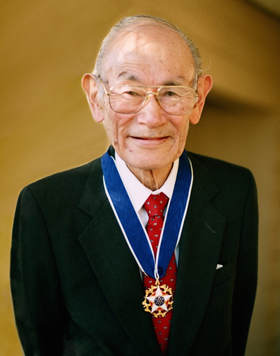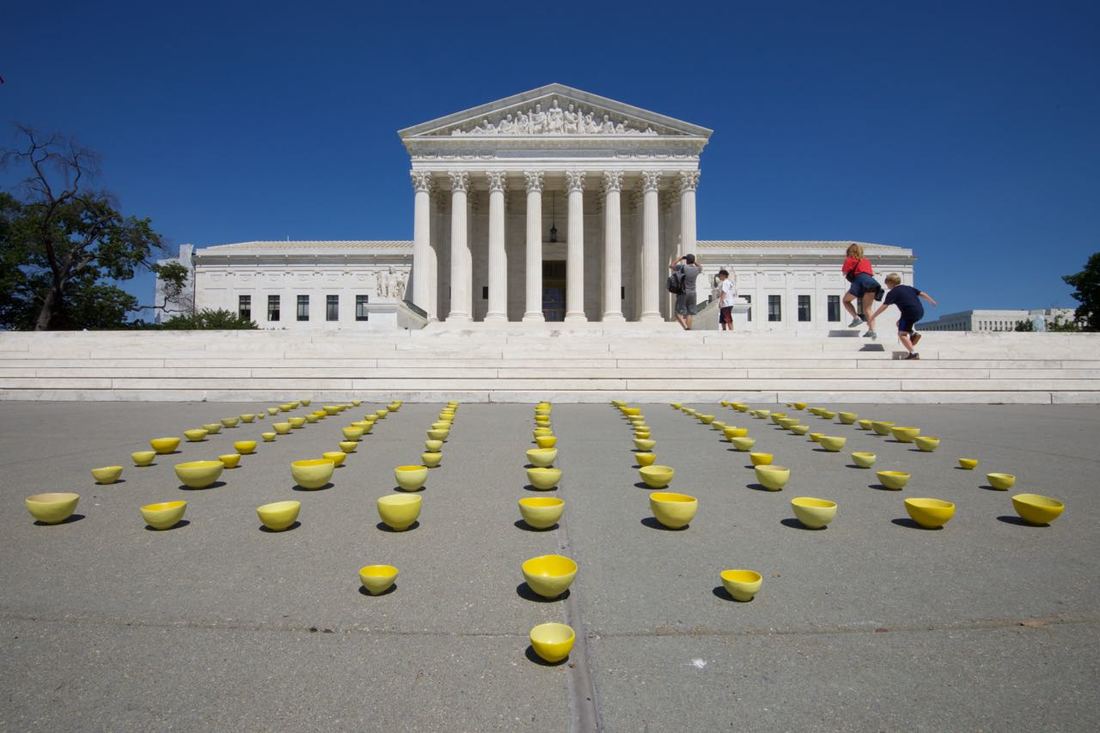|
While it hasn’t been reported widely, you can now help celebrate and spread the word that January 30 was unanimously adopted as Korematsu Day in New York City as of December 19, 2017. http://legistar.council.nyc.gov/LegislationDetail.aspx?ID=2386576&GUID=B6706EBB-16CB-4562-8024-340D2E21264D January 30 is celebrated as The Fred Korematsu Day of Civil Liberties and the Constitution in California as of September 23, 2010. It’s also celebrated in the states of Hawaii (2013), Virginia, (2015), and Florida (2016) and recognized in perpetuity. It was also celebrated in Illinois in 2014, but it is not clear whether the proclamation extended past the year. Georgia, Michigan, Pennsylvania and Utah have submitted resolutions honoring the day, and South Carolina has submitted a bill to their legislature. https://en.wikipedia.org/wiki/Fred_Korematsu_Day Korematsu v. United States is an important Supreme Court case that was tried in 1944. It is considered a landmark Civil “Wrong” in the world of jurisprudence. To learn more, see my "Justice for All? Justice for Some..." blog post (below), which explains how it distorts the idea of Justice for all.
7 Comments
I had heard that the term “racism” first entered the Supreme Court lexicon in the 1944 case Korematsu v. United States. In my search to find that incident, I came across this handy list of 10 Racist US Supreme Court Rulings which illustrates the issue of not civil rights, but Civil Wrongs: https://www.thoughtco.com/racist-supreme-court-rulings-721615 1 Dred Scott v. Sandford (1856) 2 Pace v. Alabama (1883) 3 The Civil Rights Cases (1883) 4 Plessy v. Ferguson (1896) 5 Cumming v. Richmond (1899) 6 Ozawa v. United States (1922) 7 United States v. Thind (1923) 8 Lum v. Rice (1927) 9 Hirabayashi v. United States (1943) 10 Korematsu v. United States (1944) Of these ten, five were ruled against Asians and Asian Americans. Of the five, three were rulings found against a person of Japanese ancestry. I always wondered why Asians were not included in discussions about discrimination in the US and I suspect it is because for most of this country’s history, anti-Asian discrimination was (and is still deemed legal by some, in some form, to some degree). Korematsu v. United States is a good example of that. In 1942, a Japanese American named Fred Korematsu questioned the constitutionality of EO 9066, which gave the US military license to exclude anyone from what they declared to be a military zone. It didn’t specify race but when enacted, the government chose to exclude only persons of Japanese ancestry. Korematsu refused to comply and was arrested, and he and his case made its way through the courts, finally making it to the Supreme Court in 1944. (from Wikipedia) In a 6–3 decision, the Court sided with the government,[2] ruling that the exclusion order was constitutional. Six of the eight appointees of President Franklin Roosevelt sided with Roosevelt. The two others and the lone Herbert Hoover appointee, Owen Roberts, dissented. Justice Frank Murphy issued a vehement dissent, saying that the exclusion of Japanese "falls into the ugly abyss of racism", and resembles "the abhorrent and despicable treatment of minority groups by the dictatorial tyrannies which this nation is now pledged to destroy". He also compared the treatment of Japanese Americans with the treatment of Americans of German and Italian ancestry, as evidence that race, and not emergency alone, led to the exclusion order which Korematsu was convicted of violating: “I dissent, therefore, from this legalization of racism. Racial discrimination in any form and in any degree has no justifiable part whatever in our democratic way of life. It is unattractive in any setting, but it is utterly revolting among a free people who have embraced the principles set forth in the Constitution of the United States. All residents of this nation are kin in some way by blood or culture to a foreign land. Yet they are primarily and necessarily a part of the new and distinct civilization of the United States. They must, accordingly, be treated at all times as the heirs of the American experiment, and as entitled to all the rights and freedoms guaranteed by the Constitution.” The Entry of “Racism” into the Supreme Court Lexicon Justice Murphy's two uses of the term "racism" in this opinion, along with two additional uses in his concurrence in Steele v Louisville & Nashville Railway Co, decided the same day, are among the first appearances of the word "racism" in a United States Supreme Court opinion. The first appearance was in Justice Murphy's concurrence in Ex parte Endo, 323 U.S. 283(1944).[14] The term was also used in other cases, such as Duncan v. Kahanamoku, 327 U.S. 304 (1946) and Oyama v. California, 332 U.S. 633 (1948). It then disappeared from the court's lexicon for 18 years—it reappeared in Brown v. Louisiana, 383 U.S. 131 (1966). It did not appear in Loving v. Virginia, 388 U.S. 1 (1967),[15] even though that case did talk about racial discrimination and interracial marriages. In 1983, U.S. District Court for the Northern District of California Judge Marilyn Hall Patel overturned the 1944 decision and vacated Korematsu’s conviction. By writ of coram nobis, the court’s finding said that government misconduct (namely the suppression of key evidence by the prosecution) enabled the government to win its case. Unfortunately, the Supreme Court decision still stands, but the federal Commission on Wartime Relocation and Internment of Civilians concluded in its 1983 report, "Personal Justice Denied," that the Korematsu case "lies overruled in the court of history." That report also found that no person of Japanese ancestry was ever found guilty of treason or espionage. Whether Korematsu can be used as precedent still arises however. Recently, it has been referred to as precedent by some Trump supporters. Most legal scholars believe it’s deemed overturned. (from Wikipedia) Constitutional lawyer Bruce Fein argued that the Civil Liberties Act of 1988 granting reparations to the Japanese Americans who were interned amounts to Korematsu having been overturned by history[8] – even though the Supreme Court has not explicitly overturned it.[5] According to Harvard University's Felix Frankfurter Professor of Law Noah Feldman, "a decision can be wrong at the very moment it was decided – and therefore should not be followed subsequently."[9] Justice Anthony M. Kennedy applied this approach in Lawrence v. Texas to overturn Bowers v. Hardwick and thereby strike down anti-sodomy laws in 14 states. The implication is that decisions which are wrong when decided should not be followed even before the Court reverses itself, and Korematsu has probably the greatest claim to being wrong when decided of any case which still stands.[9] Legal scholar Richard Primus applied the term "Anti-Canon" to cases which are "universally assailed as wrong, immoral, and unconstitutional"[5] and have become exemplars of faulty legal reasoning.[7] Plessy v. Ferguson is one such example, and Korematsu has joined this group – as Feldman put it, "Korematsu's uniquely bad legal status means it's not precedent even though it hasn't been overturned."[9] http://encyclopedia.densho.org/Korematsu_v._United_States/ https://en.wikipedia.org/wiki/Korematsu_v._United_States On a more positive note: January 30 : Officially Korematsu Day in New York City While it hasn’t been reported widely, you can now help celebrate and spread the word that January 30 was unanimously adopted as Korematsu Day in New York City as of December 19, 2017. http://legistar.council.nyc.gov/LegislationDetail.aspx?ID=2386576&GUID=B6706EBB-16CB-4562-8024-340D2E21264D January 30 is celebrated as The Fred Korematsu Day of Civil Liberties and the Constitution in California as September 23, 2010. It’s also celebrated in the states of Hawaii (2013), Virginia, 2015, and Florida (2016) and recognized in perpetuity. It was also celebrated in Illinois in 2014 but it is not clear whether the proclamation extended past the year. Georgia, Michigan, Pennsylvania and Utah have submitted resolutions honoring the day, and South Carolina has submitted a bill to their legislature. https://en.wikipedia.org/wiki/Fred_Korematsu_Day |
Setsuko WinchesterMy Yellow Bowl Project hopes to spur discussion around these questions: Who is an American? What does citizenship mean? How long do you have to be in the US to be considered a bonafide member of this group? Archives
June 2021
Categories |


 RSS Feed
RSS Feed